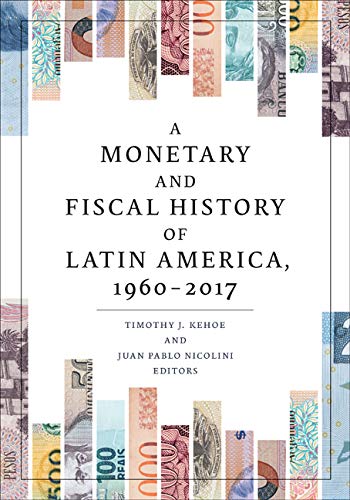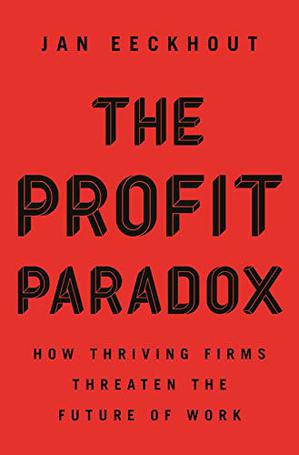EconomicDynamics Newsletter
Volume 23, Issue 1 (April 2022)
The EconomicDynamics Newsletter is a free supplement to the Review of Economic Dynamics (RED). It is published twice a year in April and November.
Marina Azzimonti and Loukas Karabarbounis, Editors.
In this issue
-
SED: Letter from the President
-
EconomicDynamics Research Agenda: Javier Bianchi on Financial Crises and Prudential Policies
-
Book Review: A Monetary and Fiscal History of Latin America, 1960–2017 by Timothy J. Kehoe and Juan Pablo Nicolini
-
Book Review: The Profit Paradox:How Thriving Firms Threaten the Future of Work by Jan Eeckhout
Letter from the President
Dear Colleagues:
I’m happy to report that we are on track to have a fully productive—and fully in-person!—summer meeting hosted by the University of Wisconsin-Madison on June 28-30. I want to thank our program chairs Yan Bai (Rochester) and Yongs Shin (WashU) for putting together a fabulous program that includes plenary talks by Gita Gopinath (Harvard/IMF), Giuseppe Moscarini (Yale), and Esteban Rossi-Hansberg (Chicago). And special thanks go to Kim Ruhl (Wisconsin) who stepped up as the local chair when we found out that Taipei had to be rescheduled.
In other news, there will soon be some updates on our officer page. When we officially incorporated the Society in 2008, we drafted by-laws with terms for the officers: three years for the President and seven years for the Treasurer and Secretary. In the case of the presidency, the years of service coincide with the the planning years of the annual conferences that they organize. In my case, this would be the year before the Barcelona 2020 conference, followed by Taipei 2021, and then completed the year before Cartagena 2022. As all of you know, this is not how the movie turned out. But I’m happy to report that we are still planning to have meetings in Cartagena (2023), Barcelona (2024), and Taipei (2025). Furthermore, it will be a joint effort between me and the recently announced President-elect: Juan Pablo Nicolini (Minneapolis Fed/Di Tella). Juan Pablo will co-serve during the meetings originally planned by me before taking over fully to organize the 2026-2028 meetings. Erwan Quintin (Wisconsin), who has served as Treasurer since 2015, is completing his last year. I am extremely grateful for all of the help he has given to me and to the Society. Thankfully, Todd Schoellman (Minneapolis Fed) has agreed to serve as the next Treasurer and is already learning the ropes from Erwan. Marina Azzimonti (Stony Brook) will stay on for another year so that there is not too much depletion of our institutional knowledge. Loukas Karabarbounis (Minnesota) has also agreed to stay on for another term as Coordinating Editor at the Review of Economic Dynamics.
Finally, I want to thank the ASSA 2022 webinar organizers— Ludwig Straub (Harvard), Hanno Lustig (Stanford), and Kyle Herkenhoff (Minnesota) for there efforts in putting together the winter SED sessions. If you missed them, you can check them out on YouTube.
As always, I encourage everyone to check out the SED website and Twitter account for real-time updates on our summer event.
Ellen McGrattan
President, Society for Economic Dynamics
Back to Menu
Book Reviews

A Monetary and Fiscal History of Latin America, 1960-2017
Timothy J. Kehoe and Juan Pablo Nicolini (Authors)
A journey through the history of inflation and government debt in Latin America. The compilation of Kehoe and Nicolini unifies the volatile experiences of these countries using theory and data, and challenges us with unanswered questions. A must read for scholars interested in monetary and fiscal policy!
Cristina Arellano
What went wrong with the economic development of Latin America over the past half-century? Along with periods of poor economic performance, the region’s countries have been plagued by a wide variety of economic crises. This major new work brings together dozens of leading economists to explore the economic performance of the ten largest countries in South America and of Mexico. Together they advance the fundamental hypothesis that, despite different manifestations, these crises all have been the result of poorly designed or poorly implemented fiscal and monetary policies.
Each country is treated in its own section of the book, with a lead chapter presenting a comprehensive database of the country’s fiscal, monetary, and economic data from 1960 to 2017. The chapters are drawn from one-day academic conferences—hosted in all but one case, in the focus country—with participants including noted economists and former leading policy makers. Cowritten with Nobel Prize winner Thomas J. Sargent, the editors’ introduction provides a conceptual framework for analyzing fiscal and monetary policy in countries around the world, particularly those less developed. A final chapter draws conclusions and suggests directions for further research.
A vital resource for advanced undergraduate and graduate students of economics and for economic researchers and policy makers, A Monetary and Fiscal History of Latin America, 1960–2017 goes further than any book in stressing both the singularities and the similarities of the economic histories of Latin America’s largest countries.
Back to Menu

